Local computer company Aquarius announced last week that it will begin production of AMP Netconnect cables, a U.S. brand belonging to Tyco Electronics. Three months earlier, Aquarius signed a contract to produce computers for Hewlett-Packard.
Both the Hewlett-Packard computers and the AMP Netconnect cables are to be produced at the Voskhod Research Institute in Moscow.
Cables from the Voskhod factory will cover 80 percent of the company's local distribution, said Valery Kapustyan, an official at AMP Netconnect Russia. AMP's local representative office will be able to widen its array of products and restock more efficiently, he said. Earlier, there was a one-month waiting period for new shipments.
Local production, however, will not reduce the cost of AMP Netconnect cables, which are some of the most expensive on the market, said Aquarius general director Vladimir Shibanov. He said the Aquarius products will be of the same quality as their imports and that even the packaging will be identical.
Aquarius and AMP are only cooperating on a small scale.
Voskhod produces between 300 and 600 cables per day, with prices ranging from $3 to $12, and income from the operation is just 1 percent of Aquarius' turnover, said Aquarius deputy general director Vladimir Piskunov. However, production will increase threefold by the end of the year, he said.
Voskhod is upbeat about the contract.
"It fits in with our Technopark concept," said Olga Alekhna, head of Voskhod's marketing department, referring to the institute's project to unite research, production and service companies under one roof.
Aquarius is still far from the business model of the majority of Chinese high-tech companies, which work only on orders from other firms. A big part of Aquarius' production capacity is used to make its own brand of computers.
In the near future, the Voskhod factory, which can produce 36,000 personal computers a year, will be devoted entirely to Hewlett-Packard, Alekhna said. Nonetheless, producing those computers will not be Aquarius' main business. The company's factory in Shuyi, Western Siberia, whose capacity is four times greater than Voskhod, is used for the assembly of Aquarius PCs, Alekhna said.
Kvant, a large computer factory in Zelenograd, may turn fully "Chinese."
"The factory could produce personal computers for practically all brands on the market," said Valery Andreyev, marketing and development manager. The factory has a capacity of 800,000 computers a year, he said.
And that plan is already under way: In November, Fujitsu Siemens Computers took an experimental first batch of 3,000 computers, and negotiations are under way for the next delivery, for 10,000 computers.
Neither Aquarius nor Kvant are expecting orders for more complicated equipment.
"In order to make ... more complicated switching equipment, sizable investment is needed," said Andreyev. "But in the present state of the market, it's difficult to count on big investment."
Of Russian producers, only Formoza has the equipment necessary for such orders, at its Moscow Altair factory.
Representatives at Formoza refused comment. One employee, however, said management is "in negotiations about producing under the brand of a different company."
A Message from The Moscow Times:
Dear readers,
We are facing unprecedented challenges. Russia's Prosecutor General's Office has designated The Moscow Times as an "undesirable" organization, criminalizing our work and putting our staff at risk of prosecution. This follows our earlier unjust labeling as a "foreign agent."
These actions are direct attempts to silence independent journalism in Russia. The authorities claim our work "discredits the decisions of the Russian leadership." We see things differently: we strive to provide accurate, unbiased reporting on Russia.
We, the journalists of The Moscow Times, refuse to be silenced. But to continue our work, we need your help.
Your support, no matter how small, makes a world of difference. If you can, please support us monthly starting from just $2. It's quick to set up, and every contribution makes a significant impact.
By supporting The Moscow Times, you're defending open, independent journalism in the face of repression. Thank you for standing with us.
Remind me later.


